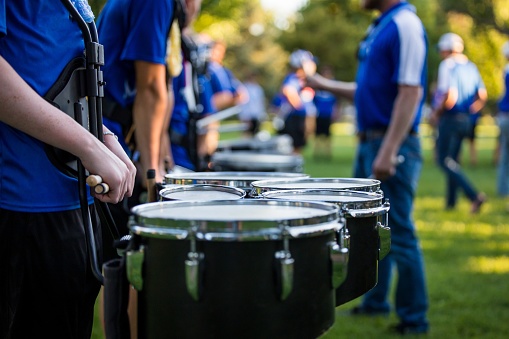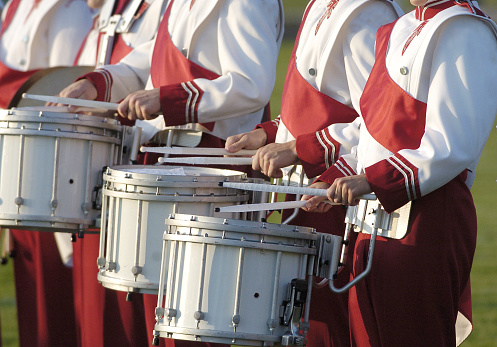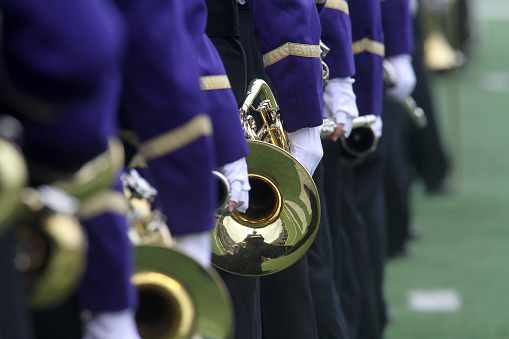If you’ve ever wondered what a drum major is in a high school setting, you’ve come to the right place.
In this blog post, we’ll explore what a drum major is and what their role entails in a high school marching band.
Everything You Need to Know About Drum Majors in High School
We’ll also discuss how to become a drum major, the skills needed, and the benefits of the position.
Read on to learn everything you need to know about drum majors in high school.
The Role of the Drum Major

A drum major is the leader of a marching band, and is responsible for conducting the band in performances and rehearsals.
The drum major is the leader of the entire ensemble, and helps to maintain order among the musicians.
The role of the drum major has been around for centuries and was originally meant to keep a marching band in time during their performances.
Today, the role of the drum major has evolved to include much more than just keeping a band in step. The drum major is responsible for setting the tempo and directing the band’s overall performance.
He or she is also responsible for organizing the band during performances, including entrances and exits.
The drum major must also ensure that everyone is playing and marching together, while still being aware of the crowd’s reaction to their performance.
The drum major must be knowledgeable in a wide range of musical styles, including jazz, classical, and contemporary music.
In addition, they must possess good communication and interpersonal skills as they are often responsible for motivating and leading their bandmates.
Overall, the role of the drum major is an important one that requires an individual with great leadership skills, musical knowledge, and enthusiasm for their craft.
The Selection Process
To be considered for the position, each student will typically have to perform a marching drill, demonstrate their ability to lead the band during music performances, and present their leadership skills.
The judges will evaluate each student on their skill level and attitude. After the tryouts are complete, a student will be chosen based on the judges’ decision.
Once a student is chosen for the position, they will receive training throughout the summer before their school year begins.
This training typically includes instruction on proper marching techniques, conducting, and how to effectively lead the band.
Once the school year begins, the drum major will take on their responsibilities as the leader of the marching band.
They will oversee all rehearsals, provide direction during halftime shows, coordinate with other staff members, and serve as a liaison between the director and the students.
They may also need to attend meetings with other staff members such as coaches and athletic directors.
Along with being responsible for leading the band during performances, drum majors also serve as role models for other members of the group by setting good examples both on and off the field.
The job of a high school drum major is often very demanding yet rewarding at the same time.
Not only do they get to interact with some amazing people while developing their own leadership skills, but they also get to make memories that can last them a lifetime.
With dedication, determination, and hard work, being a drum major in high school can be one of the most rewarding experiences someone can have.
The Responsibilities of the Drum Major

The primary responsibility of the drum major is to act as a leader for their band. They are in charge of maintaining the morale, discipline and organization of the band.
They provide direction for the band, set a good example for the other members, and ensure that rehearsals and performances run smoothly.
The drum major is also responsible for leading warm-ups and exercises during rehearsals and performances.
They often lead the band in marching drills and cadences, as well as in music and other activities. During performances, they are responsible for conducting the band, leading any changes in tempo or dynamics, and ensuring the band plays with correct timing and execution.
The drum major may also be responsible for teaching younger members of the band. They will often demonstrate musical examples, instruct marching formations, and work with individual members on their musical and marching skills.
They may also help to create performance plans, coordinate logistics for performances, and assist with fundraising activities for the band.
Finally, the drum major must be a role model for their fellow members of the band. They are expected to show good character, enthusiasm, respect for others, and commitment to the group.
In short, the drum major is responsible for helping to make their band a success!
The Benefits of Being a Drum Major
Being a drum major in high school can offer many rewards and benefits. As the leader of a marching band, you’ll be responsible for leading and motivating your peers, something that is sure to look good on college applications.
Additionally, you’ll gain valuable leadership experience and develop your skills in organization and delegation.
Being a drum major also offers you a chance to express yourself artistically. You can use this opportunity to showcase your own creativity and artistic vision by choreographing new routines, creating exciting drill patterns, and inspiring your bandmates with creative ideas.
Lastly, being a drum major will give you a sense of belonging and camaraderie with your peers.
As the leader of the marching band, you will have the responsibility of guiding and motivating your fellow students, and this can create an incredible bond between you and them.
This bond can last for years, creating meaningful relationships with the people in your community.
conclusion
Being a drum major in high school is a fantastic way to get involved in the music program and gain leadership skills.
It’s a role that requires dedication, hard work, and commitment. You’ll have to be organized and reliable to make sure the band is running smoothly and performing its best.
But with the right attitude and work ethic, the rewards of being a drum major are immense.
You’ll gain invaluable experience, make lifelong friendships, and have lots of fun along the way.






